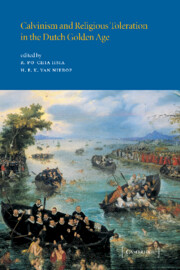Book contents
- Frontmatter
- Contents
- Notes on contributors
- 1 Introduction
- 2 ‘Dutch’ religious tolerance: celebration and revision
- 3 Religious toleration in the United Provinces: from ‘case’ to ‘model’
- 4 The bond of Christian piety: the individual practice of tolerance and intolerance in the Dutch Republic
- 5 Religious policies in the seventeenth-century Dutch Republic
- 6 Paying off the sheriff: strategies of Catholic toleration in Golden Age Holland
- 7 Sewing the bailiff in a blanket: Catholics and the law in Holland
- 8 Anabaptism and tolerance: possibilities and limitations
- 9 Jews and religious toleration in the Dutch Republic
- 10 Religious toleration and radical philosophy in the later Dutch Golden Age (1668–1710)
- 11 The politics of intolerance: citizenship and religion in the Dutch Republic (seventeenth to eighteenth centuries)
- Select bibliography
- Index
4 - The bond of Christian piety: the individual practice of tolerance and intolerance in the Dutch Republic
Published online by Cambridge University Press: 08 July 2009
- Frontmatter
- Contents
- Notes on contributors
- 1 Introduction
- 2 ‘Dutch’ religious tolerance: celebration and revision
- 3 Religious toleration in the United Provinces: from ‘case’ to ‘model’
- 4 The bond of Christian piety: the individual practice of tolerance and intolerance in the Dutch Republic
- 5 Religious policies in the seventeenth-century Dutch Republic
- 6 Paying off the sheriff: strategies of Catholic toleration in Golden Age Holland
- 7 Sewing the bailiff in a blanket: Catholics and the law in Holland
- 8 Anabaptism and tolerance: possibilities and limitations
- 9 Jews and religious toleration in the Dutch Republic
- 10 Religious toleration and radical philosophy in the later Dutch Golden Age (1668–1710)
- 11 The politics of intolerance: citizenship and religion in the Dutch Republic (seventeenth to eighteenth centuries)
- Select bibliography
- Index
Summary
Dutch society in the Golden Age presents a Janus-faced image. On the one hand, people at all levels of Dutch society were, according to foreign observers, intensely engaged with religion. A huge pamphlet literature permanently highlighted confessional differences, and preaching – in all confessions – made a high priority of attacking the doctrines of other Churches. On the other hand, this was also a society that became proverbial for religious toleration and where religiously inspired violence was rare. Scholars have come up with a range of different explanations for this phenomenon. One solution is to assume that believers of different confessions tried to avoid each other as much as possible, under the guidance of a state that exerted itself to contain potential conflict. In the late 1970s, A.Th. van Deursen concluded that Golden Age believers of all denominations ‘over the fortifications of their church walls, could only see heretics and never fellow Christians of another confession’. According to this line of argument, it was through a form of social and cultural apartheid, more or less in the style of Dutch society between 1880 and 1960, that these divisions did not lead to open violence.
There is indeed little doubt that all Churches were aiming for segregation. Every Church promoted education, charity, and marriage within the boundaries of its own confession.
- Type
- Chapter
- Information
- Publisher: Cambridge University PressPrint publication year: 2002
- 3
- Cited by



